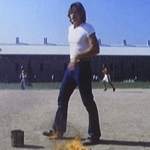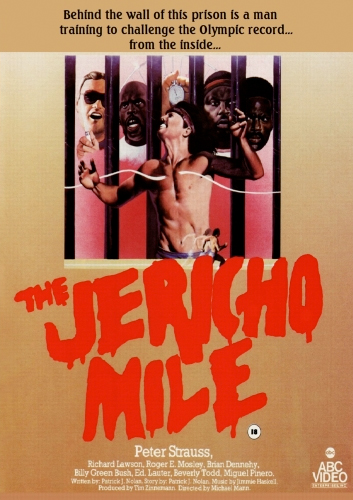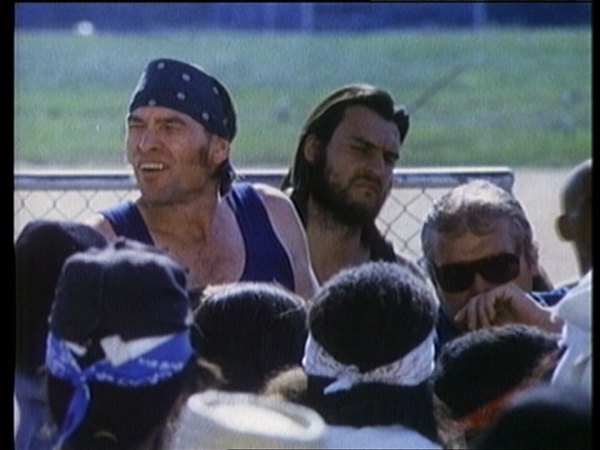
 If you count TV movies – and I do – JERICHO MILE is Michael Mann’s directivational debut. It’s not as cinematic as his later big, wide movies, but it’s from the days when TV movies were legit enough to play theatrically overseas. It also stood out from other TV at the time, winning Emmies for writing, lead actor (over Kurt Russell in ELVIS!) and film editing for a limited series or special, and a Director’s Guild Award for “Outstanding Directorial Achievement in Special/Movies for TV/Actuality.” (?)
If you count TV movies – and I do – JERICHO MILE is Michael Mann’s directivational debut. It’s not as cinematic as his later big, wide movies, but it’s from the days when TV movies were legit enough to play theatrically overseas. It also stood out from other TV at the time, winning Emmies for writing, lead actor (over Kurt Russell in ELVIS!) and film editing for a limited series or special, and a Director’s Guild Award for “Outstanding Directorial Achievement in Special/Movies for TV/Actuality.” (?)
It’s a prison movie, and you know Mann isn’t gonna want to soften that up. I mean, it’s TV so we don’t get any profanity, racial slurs or rape, but it’s still got a gritty feel because it was filmed in Folsom with the real inmates all around, and plenty of establishing montages that are clearly just documentary footage. You can definitely tell that some of the supporting players are real cons. I wasn’t surprised when I read that Mann had to negotiate for each of the race gangs (white, black and Latin) to have representatives on screen and vow to prevent any race wars or riots during filming so the production wouldn’t be kicked out. I mean obviously it’s an unwritten rule on pretty much all movie sets that the actors should not be involved in any race wars. But I still give them credit for not having one. Apparently there were a bunch of stabbings, one fatal, but those were allowed.
Mann also smoothed things over by having author/Reservoir Dog Eddie Bunker as a guide, and by casting inmate turned playwright and poet Miguel Piñero as the leader of the Mexican gang. I’m not sure if they were as impressed by Brian Dennehy, who played Dr. D, the white kingpin. He actually plays him kinda like Jason Alexander would play him. He feels he can just sit there and be a wiseass because he has big muscle dudes with Nazi tattoos standing around him.
 But this is also a sports movie. It’s like Mann’s version of THE LONGEST YARD. It’s not as broadly comic (or comic at all, really), but it has the same siding-with-a-convict and underdog sports movie appeal. And it just reminds me more of that one than of UNDISPUTED or DEATH RACE. Peter Strauss (Rich Man, Poor Man) stars as Detective Miles Jericho… or, my mistake, as Larry Murphy, nick-named Lickety Split by the black guys because he spends all his time in the yard running in circles. Fast. Not fast enough that he didn’t get caught, I guess, but I’m telling you, he’s fast. Other guys lift weights, dance around with a boombox, cheer on The Price Is Right, but he hauls ass. That’s pretty much all he does.
But this is also a sports movie. It’s like Mann’s version of THE LONGEST YARD. It’s not as broadly comic (or comic at all, really), but it has the same siding-with-a-convict and underdog sports movie appeal. And it just reminds me more of that one than of UNDISPUTED or DEATH RACE. Peter Strauss (Rich Man, Poor Man) stars as Detective Miles Jericho… or, my mistake, as Larry Murphy, nick-named Lickety Split by the black guys because he spends all his time in the yard running in circles. Fast. Not fast enough that he didn’t get caught, I guess, but I’m telling you, he’s fast. Other guys lift weights, dance around with a boombox, cheer on The Price Is Right, but he hauls ass. That’s pretty much all he does.
He’s mostly a loner, doesn’t talk much, but he does have one close friend, Stiles (Richard Lawson, SCREAM BLACULA SCREAM), who has the cell next to his and runs with him (but can’t keep up). Murphy is a lifer who chooses not to ever think about the outside world, since he’ll never see it again. He worries about Stiles, who pines for his hot wife and new baby back home, keeps showing their pictures to him, won’t stop talking about them. This makes him vulnerable to Dr. D, who tries to use his yearning for an early conjugal to get him involved in drug muling. Stiles (who is black, by the way) doesn’t want any part of it, which gets him into trouble with Dr. D and the white supremacists, which gets Murphy into trouble too. The gang comes down hard on him and the other gangs aren’t jumping to get some white guy’s back.
Meanwhile there’s this sports writer interviewing inmates for a piece he’s doing (probly a little bit of Mann semi-autobiographicalness going on there) and he notices how fast Murphy is. Word starts to spread. Some of the prison staff (who are never portrayed as assholes, which is unusual) start to think they should do something with his talents. Geoffrey Lewis (in nice guy mode) is the prison psychiatrist I think, and he calls in coach Ed Lauter to check out Murphy and talk to him and stuff. He determines that he’s getting up there with the fastest runners of the world, and he can teach him some pro tricks to be even faster.
After some initial reluctance on Murphy’s part they come up with a scheme to get him a qualifying race for the Olympic trials. But they gotta build a certified track inside the yard and that will require the help and cooperation of the prison population. So there’s your prison politics. They gotta figure out how to get Dr. D out of the way.
Murphy is a really appealing badass because he’s quiet but unwavering. He has accepted that he’s a lifer and doesn’t complain about it. He admits he did the crime and doesn’t even usually get into why he still feels he was justified, because it’s irrelevant to the rest of his life. But he doesn’t trust anybody. More than once he reacts defensively to these guys but when he realizes they sincerely share his love of running he lets his guard down. You can tell it means alot to him to have someone to talk about the feeling of “gliding on air” he has when he runs.
That’s another reason this appeals to me, it’s a love letter to running. It makes so much sense as his method of mental escape. It’s a form of meditation. It’s a way to be completely alone. He didn’t know it was gonna turn into this big thing, and ultimately he has to get his solitude back.
Anyway Murphy’s got a code, he’s stubborn, he does what he feels is honorable, almost always at his own expense. On two occasions he picks a fight he can’t win just to defend the name of the late Stiles.
This character was also the inspiration for the character Stiles in TEEN WOLF, who was originally supposed to be Teen Wolf’s friend who gets killed by white supremacists for refusing to be a drug mule.
Before this Mann had directed a couple documentary shorts and an episode of Police Woman. He’d also written for some TV shows, including Starsky & Hutch. He did some uncredited work on STRAIGHT TIME, which is where he met Eddie Bunker, and which is kind of the opposite of this because Dustin Hoffman is trying to stay out of prison and is not trying to be in the Olympics.
In many ways this is more normal than what later became the Mann style. Some of Jimmie Haskell (NIGHT OF THE LEPUS, DIRTY MARY CRAZY LARRY)’s scoring is pretty standard, for example. On the other hand alot of it is set to what sounds like an extended jam on the intro to “Sympathy For the Devil.” (I’m betting that was his temp track.) That seems like a hint at the use of classic or contemporary rock that will later become an important part of his work. He does use slo-mo, but it’s for a part where anybody would’ve done it, it’s not really the same thing as he does later.
I think the biggest sign that it’s him is the obsession with authenticity. Researching prison gangs, using real people and locations, sometimes in cinema verite montages of life in Folsom. Variations on Murphy’s tough talk about doing time are repeated in multiple Mann works, including HEAT, and this theme of sharpening your mental and physical fitness for surviving behind bars came up again just this summer in BLACKHAT.
By the way, does this handsome white supremacist in the middle here look familiar?

He did to me, but I had to check the credits to verify that yes, that’s Richard Moll from Night Court and HOUSE.
This one’s only on VHS in the U.S., but there are some import DVDs available. It’s not widescreen anyway so it’s not that big of a deal. I know you Richard Moll completists are already sold, but everybody else should check it out too in my opinion.


























March 9th, 2015 at 10:28 am
I believe you mean Richard Moll from THE SWORD AND THE SORCERER, SURVIVOR, and T.J. HOOKER.